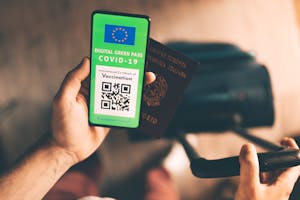- 7 minute read
- COVID-19 Resources
- Digital Marketing
- Local Strategies
Are We Back to “Normal” Yet? 5 Post-Pandemic Marketing Tips to Implement Now!
All Skill Levels
Join hundreds of other operators and REGISTER NOW for Spark 2024 New Orleans October 13-15th!

International travel has been slow to pick up amid the pandemic, with a variety of different restrictions and quarantine requirements in place throughout the world. The European Union Digital COVID Certificate (EUDCC), launched on July 1, 2021, aims to make travel easier within the EU, allowing travelers to quickly prove their immunization or testing status as they enter Member States.
Here’s everything you need to know about the certificate and how it will impact travel in the European Union (EU). Please note: this guide was originally published and is up to date as of August 17, 2021.
 What is the EUDCC?
What is the EUDCC? Known informally as the “immunity pass,” “health pass,” or “vaccine passport,” the European Union Digital COVID Certificate logs three things about the holder:
Any one of these factors should allow the certificate holder to be exempt from additional testing or quarantine requirements when they arrive at their destination within the EU (and a few other countries — see below).
 How does it work?
How does it work?The certificate is issued as a QR code, which the holder can choose to present digitally or on paper. EU citizens and legal residents can obtain the certificate at no cost. (There are talks of expanding it to non-citizens in the future.) The certificate will be in the national language of the issuing country as well as English.
Upon entry to a Member State, the QR code is scanned to retrieve the data listed above. Each issuing body (such as hospitals and testing centers) has a digital signature that is embedded in the QR code. When officials scan the QR code, they verify the signature of the issuing body.
Note that, while the certificate contains personal information such as name and date of birth, this information is not shared or stored when the certificate is scanned.
 Where is the certificate accepted?
Where is the certificate accepted?The certificate will be recognized by all 27 countries in the European Union as well as Switzerland, Liechtenstein, Iceland, and Norway.
Note that the United Kingdom is not included in the list, although there have been talks of the UK and other countries recognizing the EUDCC in the future. The UK has a similar NHS COVID Pass that can be obtained by those fully vaccinated through the NHS. However, this pass is not currently accepted throughout the EU, although some individual countries (such as Greece and Spain) do accept it.
 Which vaccines are accepted?
Which vaccines are accepted? Each country can specify its own rules, but the general rule is that only vaccines approved for use in the EU will count toward the certificate. These currently include AstraZeneca, Pfizer/BioNTech, Moderna, and Johnson & Johnson.
It’s also up to each county to decide whether they require both doses of the vaccine (if applicable) or just one dose to enter the country. The EU-wide rule is that those who are fully vaccinated should be exempted from travel-related testing or quarantine 14 days after receiving the second dose.
 What is the validity period for negative tests?
What is the validity period for negative tests?Travelers should be exempted from quarantine requirements if they have a negative COVID-19 test within the following timeframes:
There may be exceptions for travelers coming from areas with high case numbers.
 How do travel restrictions due to surges in cases affect certificate holders?
How do travel restrictions due to surges in cases affect certificate holders? The purpose of the certificate is to exempt holders from any restrictions on free movement. However, Member States can impose additional restrictions if they are “necessary and proportionate to safeguard public health” according to EU authorities. For example, if Member States wish to enforce restrictions due to surges in the Delta variant, they must justify the decision to EU authorities and give 48 hours’ notice before the new restrictions go into effect.
The certificate is good news for the travel and tourism industry in the European Union. It should allow easier travel while maintaining health and safety regulations in place. If the news is coming just in time for your busy season, get ready for an influx of customers with our guide to your first post-pandemic busy season. Stay up-to-date on the EUDCC on the European Commission website.